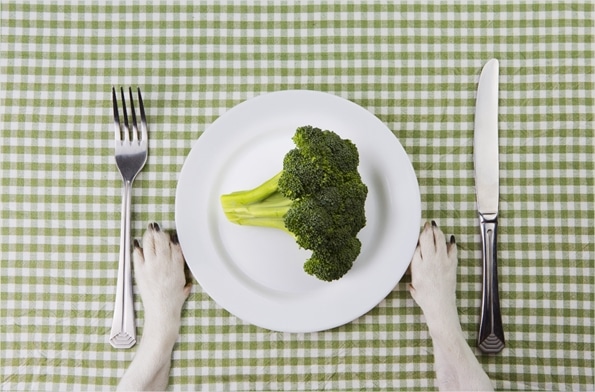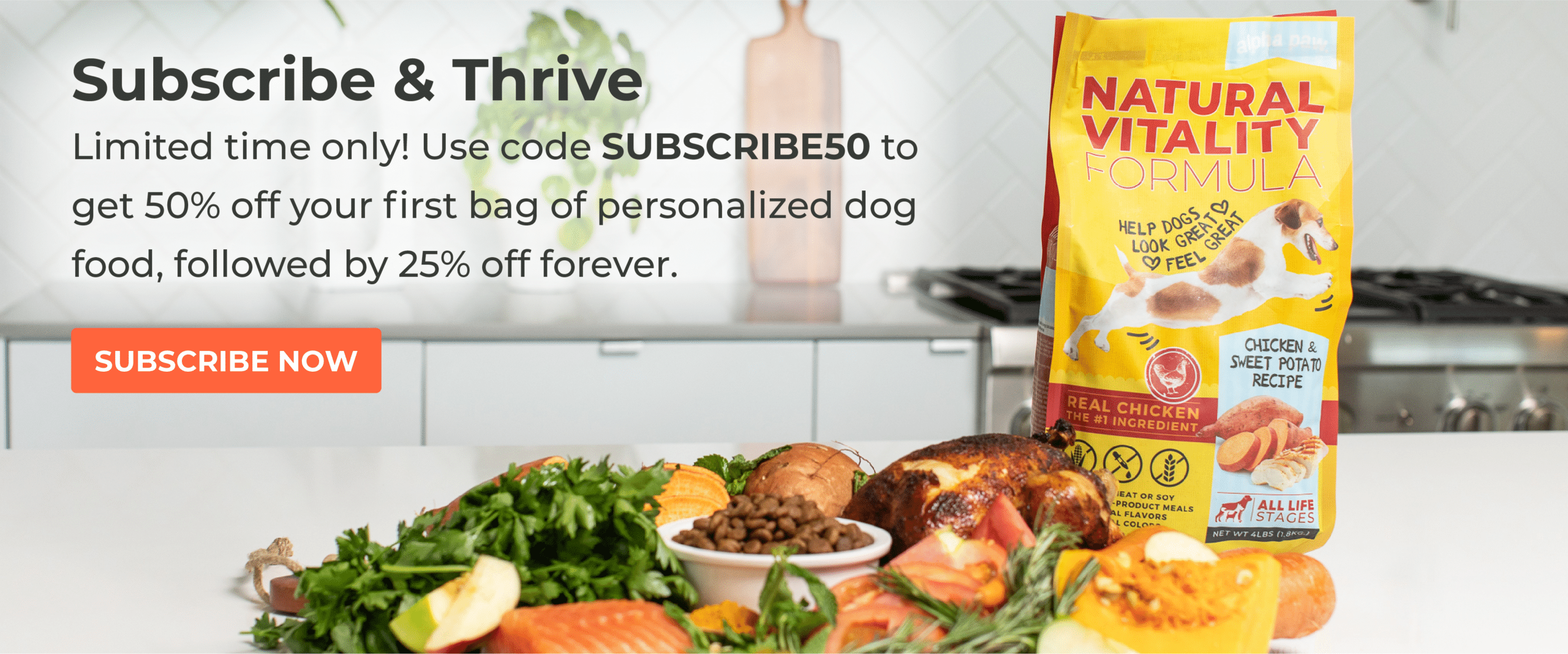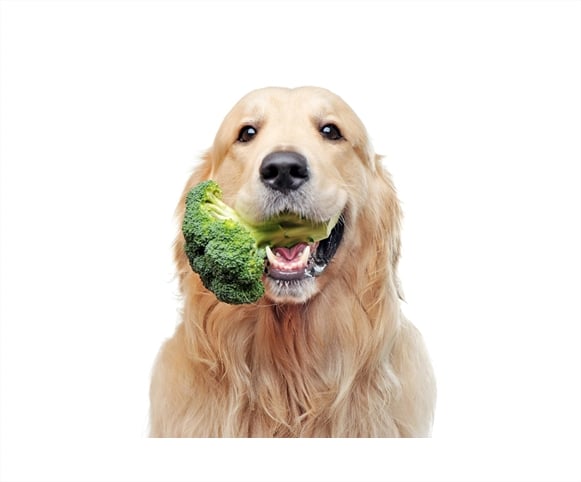


There is great emphasis these days on healthy eating among humans which can only be a good thing. One much promoted ‘superfood’ is broccoli. The green veggie is a staple item often included in family dinners, and so you may have wondered, “is broccoli safe to feed to dogs, and does broccoli have the same health benefits as it does in humans?” The answer is yes! Broccoli can be a great addition to your canine friend’s diet but in moderation.
Dogs are generally classified as carnivores, but they are actually facultative carnivores. This means that their meal should be predominantly meat but they can also ingest plant protein from fruits and vegetables. However, plant protein is not enough to maintain their health. That being said, a dog’s diet doesn’t require as many fruits or vegetables as humans do.
But that doesn’t mean you shouldn’t give your dog any. There are still loads of health benefits your pooch can get if you include plant protein as treats or when it’s included in commercial dog food.

The broccoli florets contain a compound called Isothiocyanate, which is also found in all cruciferous vegetables like cabbage, cauliflower, and kale. In humans, Isothiocyanate is considered to be very beneficial as it functions as a strong anti-inflammatory. However, the same is not necessarily true of dogs In excessive amounts, this substance can cause irritation to your dog’s gastrointestinal system. The symptoms can be as severe as gas build-up, stomach upset, diarrhea, and even blockages.

With that in mind, broccoli is safe to feed either cooked or raw. To prevent it from becoming a choking hazard, it’s highly recommended to feed your dog cooked broccoli. It’s softer than raw broccoli.
Bottom line, if you want to feed your dog broccoli, make sure it’s cooked and cut into small pieces. Make sure the added portion doesn’t contain additional fats, like processed cheese or any extra seasonings or ingredients. Your dog doesn’t need these extra calories and fat and it could also upset its stomach.
If you want to feed your dog raw or frozen broccoli be sure to wash it thoroughly beforehand as it can be a source of harmful bacteria such as salmonella. Even though dogs are more resistant to these nasty bacteria species, they are not immune to them and an overwhelming infection can result in vomiting, fever, dehydration, and lethargy should they be ingested.
The broccoli stems, although completely edible, do pose a choking hazard if consumed in large chunks as they are very hard. Be sure to cut broccoli into smaller pieces before offering it to your dog as it has been known to cause obstruction in the esophagus.
In the case of puppies, they have different nutritional needs than older dogs. They have a more specific diet that their growing bodies need. For this reason, I would avoid feeding broccoli to puppies completely as their digestive system is still developing and is very sensitive to new foods. Overdoing green vegetables in growing animals may increase the risks of gastrointestinal blockage, leading to an unwanted trip to the vets.
Some dog owners also give their puppies a broccoli stem as a healthy alternative to chewing toys. However, it poses more of a threat than health benefits. For one, it is too hard for your puppy to digest, and two, swallowing large pieces can cause intestinal blockage.
Be aware that in some rare cases, your dog may have a genuine food allergy to broccoli.
Symptoms of an allergic reaction can range from excessive diarrhea to itchy skin and even anaphylaxis (difficulty breathing). If your dog has a reaction like this, take them to your local vet immediately.
If your dog is generally an allergic or sensitive dog, this allergy medicine for dogs contains a powerhouse of natural ingredients and may help provide relief from other seasonal and environmental allergens.
Elevate your dog’s overall well-being with our top picks for canine multivitamins. We’ve handpicked a range of premium supplements to support your furry friend’s health, ensuring they receive essential vitamins and minerals for a vibrant life. From chewable treats bursting with nutrients to liquid formulations that blend seamlessly into meals, our curated selection covers various preferences and dietary needs.

Broccoli is packed full of micronutrients that are essential in a healthy diet. It is rich in vitamin K which is vital for improving bone density and strength which allows your dog to play for longer and may improve a dog’s mobility as it ages. Vitamin K is also a crucial part of the coagulation process that ensures blood clots form correctly if your dog has an open wound. Broccoli also contains high amounts of vitamin C which improves immune function, helping them to fight off infectious diseases carried by viruses and bacteria.
Broccoli is high in minerals such as magnesium, potassium, and sodium which are all involved in many normal body processes. Magnesium is crucial for proper hormone function and is involved in the proper absorption of many other micronutrients. Potassium is extremely important for proper nerve function and muscle contraction. In addition, it also contains a lot of fiber that helps improve your dog’s digestive system and folic acids for maintaining and producing healthy cells, especially for pregnant dogs.
As mentioned before too much broccoli can cause gastrointestinal upset or blockages, and this is often due to the high fiber found in broccoli. However, when fed in moderation, this fiber is essential for normal bowel movements and healthy digestion.
Broccoli is also great for your dog’s dental health, especially if fed raw (but remember to wash it). Crunching on the broccoli stems helps to break off any plaque that may have accumulated on your dog’s teeth or gums. But remember only feed in small pieces. However, the stems are very hard and so I would only recommend this if your dog hasn’t been diagnosed with any underlying or severe dental issues because this crunching could do more harm than good.
These supplements for dogs contain ALL the nutritional vitamins, minerals, antioxidants, and essential omega-3 fatty acids that will help your puppy or senior dog to stay healthy, happy, and in great tail-wagging condition!
Dogs are omnivores meaning that, much like us, they derive nutrition from both animal and plant sources. However, I would recommend that vegetables make up no more than 25% of your dogs’ overall diet, otherwise the excessive fiber may lead to the gastrointestinal issues mentioned previously. In addition to this, if you are using vegetables such as broccoli as treats then these shouldn’t make up more than 10% of your dog’s calorie needs for the day, as too much of a good thing can lead to weight gain and obesity.
Remember, broccoli is only considered safe for dogs if the total amount ingested is less than 10 percent daily. More than 25 percent of broccoli intake daily is already considered toxic. As mentioned previously, the florets of broccoli contain isothiocyanates. It’s beneficial for humans but not for dogs. In huge amounts, it can cause mild to severe gastric irritation
The actual amount of broccoli you can give to your dog differs since it depends on the size of your pooch. In addition, every dog is different and some might react more than others. As with introducing any new food to your dogs’ diet, start slow to ensure that broccoli agrees with your dog, and monitor for any signs of stomach upset.
Broccoli can be served raw or cooked, and always cut it into small pieces before offering it to your canine friend. And keep it as natural as possible, avoid cooking broccoli with seasonings, oils, and other ingredients that may cause issues
If you enjoyed reading this article, head over to our Vet Corner where more articles can be found.

The medical, nutritional, or behavioral advice we provide is intended for informational and educational purposes only. Our editorial content is not a substitute for formal or personalized medical advice from a veterinary professional. Only board-certified veterinary specialists who have examined your pet should diagnose medical conditions, provide personalized treatment, or prescribe appropriate medication. For questions regarding your pet’s health, or if your pet is exhibiting signs of illness, injury, or distress, contact your veterinarian immediately. Never disregard professional medical advice or delay in seeking it because of something you have read on our site.